Jennie Baines
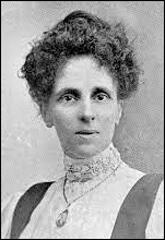
Sarah Jane Hunt (Jennie Baines), the daughter James Edward Hunt and Sarah Ann Hunt, was born in Birmingham, on 30th November 1866. Her father was a gun maker. At the age of eleven she left school and began work at an ordnance factory owned by Joseph Chamberlain. (1)
In 1880 later she joined her parents in the Salvation Army. The organisation had been established by William Booth in 1878. General Booth was deeply influenced by his wife Catherine Booth, who believed that women were equal to men and it was only inadequate education and social custom that made them men's intellectual inferiors. She was an inspiring speaker and helped to promote the idea of women preachers. The Salvation Army gave women equal responsibility with men for preaching and welfare work. (2)
Sarah got her first experience of speaking in public about social problems. She reaching the rank of lieutenant and was appointed evangelist to an independent working man's mission in Bolton and acted as police court missionary to women who had been arrested. (3) She later recalled that she had been schooled by the Salvation Army from earliest childhood in the spirit of rebellion and during this period had been arrested for making anti-establishment speeches. (4)
On 26 September 1888 she married a bootmaker, George Baines and between 1890 and 1899 she bore five children. Now known as "Jennie Baines" she remained active in politics and joined the Independent Labour Party and was a member of the Temperance Movement. (5)
Jennie Baines and the WSPU
Jennie Baines was impressed when she heard Emmeline Pankhurst speak about women's suffrage in 1903. (6) On the 13th October 1905, Baines attended a meeting at the Manchester Free Trade Hall, to hear Sir Edward Grey, a minister in the British government. When Grey was talking, Christabel Pankhurst and Annie Kenney constantly shouted out, "Will the Liberal Government give votes to women?" When the women refused to stop shouting the police were called to evict them from the meeting. Pankhurst and Kenney refused to leave and during the struggle a policeman claimed the two women kicked and spat at him. Pankhurst and Kenney were both arrested. (7)
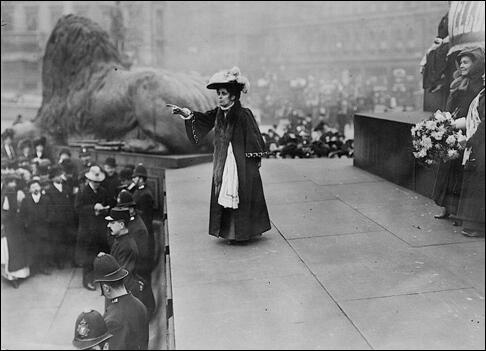
Jennie Baines was appalled by what she considered was the brutal treatment of the two women and immediately joined the Women's Social and Political Union (WSPU). On 13th December, 1906, she was arrested during a protest demonstration. Baines was arrested and sentenced to 14 days in prison. She later said it was "an experience that reinforced her concern for the treatment of women prisoners, which left her, she said, more of a rebel than ever." (8)
Baines soon became an important member of the WSPU. According to Votes for Women: "At that time she came to realise that women must have the vote to force legislation.... Mrs Baines became a member of the WSPU and for a long time worked voluntarily for the Union. Later she was appointed organizer, and since then has travelled all over the country working up meetings, speaking, and taking part at various by-elections. In particular, she was very active at Dewsbury, opposing Mr. Runciman, and is at present at work in Dundee. She has the power of holding a very large audience." (9)
The WSPU organised a mass meeting to take place on 21 June 1908 called Women's Sunday at Hyde Park. The leadership intended it "would out-rival any of the great franchise demonstrations held by the men" in the 19th century. Sunday was chosen so that as many working women as possible could attend. It is claimed that it attracted a crowd of over 300,000. At the time, it was the largest protest to ever have taken place in Britain. Speakers included Jeannie Baines, Emmeline Pankhurst, Christabel Pankhurst, Adela Pankhurst, Emmeline Pethick-Lawrence, Mary Gawthorpe, Gladice Keevil, Rachel Barrett, Marie Brackenbury, Georgina Brackenbury, Annie Kenney, Nellie Martel, Marie Naylor, Flora Drummond and Edith New. (9a)
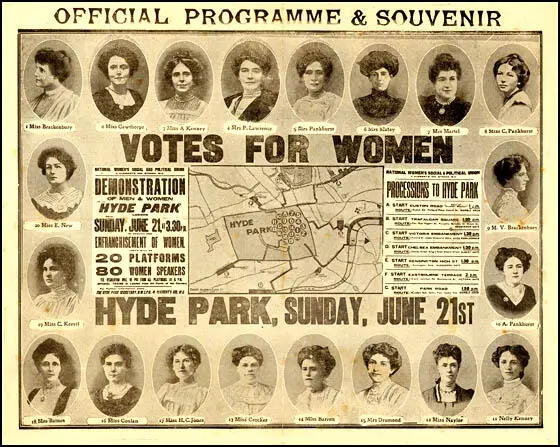
On 10 October 1908, Herbert Asquith visited Leeds. As he emerged from the railway station he was greeted by Baines and a group of WSPU members, who cried out: "Votes for Women and down with tyranny!" She then led a march to the Coliseum where he was to give a speech. "If these tyrants refuse to listen to us break down the barriers, break down the doors, and compel a hearing." (10)
Baines joined up with Alfred Kitson, who was leader of the unemployed in Leeds: "Mrs Baines - perhaps not with prudence, but with the knowledge that she was within her rights - held a meeting in furtherance of the cause of Women's Suffrage outside the Coliseum at a time when Mr Asquith, the Prime Minister, was addressing a meeting inside the building. The Leeds unemployed also held a meeting in Victoria Square, and passed a resolution which authorities the defendant Kitson, who was leader of the unemployed, to go to the Coliseum and present a petition to Mr. Asquith. Having passed the resolution, the unemployed marched to the Suffragettes' meeting with the avowed object of joining forces with them. A very large crowd was thus gathered together." (11)
Baines and Kitson were arrested and charged with causing a riot. At her trial in November 1908 she was the first WSPU member to be tried by jury. She was defended by Frederick Pethick-Lawrence but she was convicted of unlawful assembly outside the Coliseum in Leeds, she was sentenced to six weeks' imprisonment on refusing to be bound over because she did "not recognise the laws of this Court administered by men". (12)
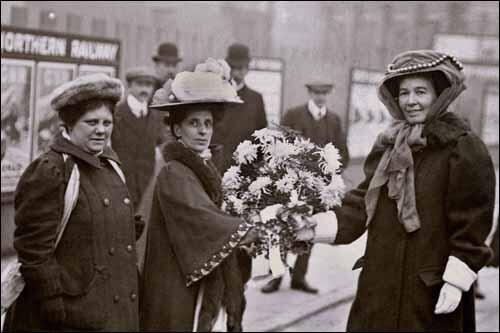
Appointed a full-time organizer in the Midlands and north of England on a wage of £2 a week, she became one of the most important figures in the movement. Baines planned demonstrations, set up new branches and addressed meetings. Baines was arrested in fifteen times, she went on hunger-strikes five times but was never force-fed because her health was too frail. (13) Annie Kenney remembered her "as one of the most kind-hearted women one could meet, a born revolutionary". (14)
Militant Action in Dublin
On 16th July, 1912, Jennie Baines and Gladys Evans caught a boat from Holyhead to Dublin and took lodgings in Lower Mount Street. Mary Leigh and Mabel Capper arrived two days later. They were in the city because Herbert Asquith was to give a speech on Home Rule to 4,000 supporters. On the 18th July, Leigh saw Asquith travelling in an open carriage with John Redmond and the Lord Mayor of Dublin. She hurled a hatchet at Asquith, but missed him and hit Redmond on his ear. (15)
According to John O'Brien, the Chief Marshall: "When abreast of Prince's Street he saw an article flung from the opposite side. He ran round by the horses' head and saw the accused (Mary Leigh) holding on to one of the rails of the carriage. He saw the accused throw the article. He pulled her away from the carriage, when she counteracted him, and started to poke him and tear at him, and struck him a couple of blows in the face." (16)
Leigh was able to escape and that night, along with Gladys Evans attended a production of the Theatre Royal. As the audience was leaving Joseph Keoth noticed a woman (Evans) throwing a burning rag soaked in paraffin into the projection box at the back of the stalls and running away as if she "expected some explosion". Evans then chucked a handbag filled with gunpowder and matches into a box near the stage. Leigh also threw a burning chair into the orchestra pit. "Several small explosions occurred, produced by amateur bombs made of tin canisters, which, with bottles of petrol and benzine, were afterwards found lying about." (17)
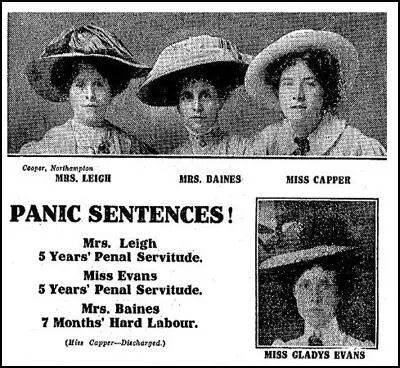
Evans was arrested at the scene and Leigh at her lodgings the next morning. Jennie Baines and Mabel Capper were also taken into custody. The four women were charged with having "unlawfully conspired with other persons, known, and unknown, to inflict grievous bodily harm and wilful and malicious damage upon property, and to cause an explosion in the Theatre Royal of a nature likely to endanger life or to cause serious injury to property; and that in pursuance of this object they attempted to set fire to the theatre." (18)
Tim Healy represented Baines, Evans and Capper and at their trial. Votes for Women reported: "In his fine and impassioned speech for the defence of Miss Gladys Evans, he (Tim Healey) was rankly contemptuous of the trifling quantity of the damage to a couple of curtains, a carpet, and two chairs, only in comparison with the vaster outrages committed by the forerunners of the present-day electors, but with a greater and still more powerful emphasis, in comparison with the daily and hourly destruction of women's and children's lives in the cities of our civilisation." (19)
Mary Leigh told them that if they sent her to prison she might not survive the sentence. Mary warned that if convicted she would fight: "she would put her back against the wall, and nothing, not even the whole army of the Government and officials, would bring her to submission. The jury returned guilty verdicts on Mary Leigh and Gladys Evans. Both women were sent to prison for five years because "no more terrible catastrophe could occur in a city than a conflagration at a theatre". Jennie Baines was sentenced to seven months with hard labour, and Mabel Capper was acquitted for lack of evidence." (20)
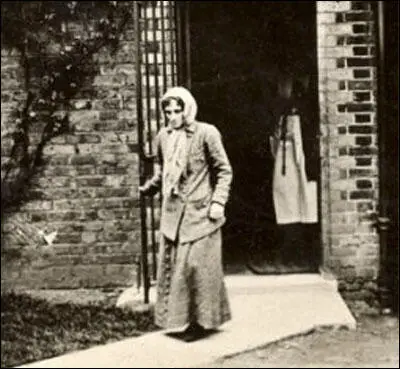
Jennie Baines immediately went on hunger strike and was released. In November 1913 she was charged with blowing up an empty railway carriage, hunger struck on remand, and was released. Baines was advised by her doctor that her health was so bad she was likely to die if she underwent another hunger-strike. Eventually she agreed that I was necessary for her and her family (husband,two sons and surviving daughter) to escape to Australia. (21)
Australia
Baines arrived in Melbourne in December 1913. She settled with her family in Fitzroy and began working for the Women's Political Association. Baines joined the Victorian Socialist Party and in January 1914, supported Vida Goldstein in her campaign to be elected for the Federal seat of Kooyong. (22) Baines also resumed her friendship with Adela Pankhurst who had been expelled from the WSPU after a dispute with her mother, Emmeline Pankhurst and her sister Christabel Pankhurst. (23)
The British government declared war on Germany on 4th August 1914. Two days later, Millicent Fawcett, the leader of the NUWSS declared that the organization was suspending all political activity until the conflict was over. Fawcett supported the war effort but she refused to become involved in persuading young men to join the armed forces. This WSPU took a different view to the war. It was a spent force with very few active members. According to Martin Pugh, the WSPU were aware "that their campaign had been no more successful in winning the vote than that of the non-militants whom they so freely derided". (24)
The WSPU carried out secret negotiations with the government and on the 10th August the government announced it was releasing all suffragettes from prison. In return, the WSPU agreed to end their militant activities and help the war effort. Christabel Pankhurst, arrived back in England after living in exile in Paris. She told the press: "I feel that my duty lies in England now, and I have come back. The British citizenship for which we suffragettes have been fighting is now in jeopardy." (25)
After receiving a £2,000 grant from the government, the WSPU organised a demonstration in London. Members carried banners with slogans such as "We Demand the Right to Serve", "For Men Must Fight and Women Must Work" and "Let None Be Kaiser's Cat's Paws". At the meeting, attended by 30,000 people, Emmeline Pankhurst called on trade unions to let women work in those industries traditionally dominated by men. She told the audience: "What would be the good of a vote without a country to vote in!". (26)
Jennie Baines, Vida Goldstein and Adela Pankhurst were all opposed to the pro-war policy of the WSPU and campaigned against the First World War and conscription introduced in 1916. In August 1917 she led a series of violent protests by women against the surging cost of living. Though sentenced to nine months' imprisonment, she was freed on appeal. Jennie was gaoled again in March 1919 for flying the prohibited red flag. Faced with six months behind bars, she resorted to hunger striking, reputedly the first prisoner in Australia to do so, and was released on the attorney-general's advice. (27)
After the war Jennie Baines continued to campaign for socialism. In one article she argued: "To fight for that which is better and nobler in this world is to live in the highest sense, but to submit and tolerate the evils which exist is to merely vegetate in the sewers of iniquity". (28)
Baines helped establish the Victorian branch of the Communist Party of Australia in 1920 but was unwilling to be accept Joseph Stalin attempts to dictate party policy and was expelled in 1925. Baines returned to the Australian Labor Party and in 1928 she was appointed special magistrate to the South Melbourne children's court. (29)
Sarah Jane Hunt (Jennie Baines) died from cancer in Port Melbourne on 20 February 1951.
Primary Sources
(1) Votes for Women (7 May 1908)
Born in Birmingham in 1886, Mrs Baines began her working life at an unusually early age, for when only eleven she was helping to support herself. While quite a girl she became deeply interested in temperance reform, and before she was twenty was appointed missionary in Bolton. Later Mrs. Baines became an active worker for the ILP, and for two years was a member of the Stockport Unemployed Committee. At that time she came to realise that women must have the vote to force legislation. When Miss Pankhurst was arrested in 1905 Mrs Baines became a member of the WSPU and for a long time worked voluntarily for the Union. Later she was appointed organizer, and since then has travelled all over the country working up meetings, speaking, and taking part at various by-elections. In particular, she was very active at Dewsbury, opposing Mr. Runciman, and is at present at work in Dundee. She has the power of holding a very large audience.
(2) Votes for Women (26 November 1908)
On October 10 Mrs Baines – perhaps not with prudence, but with the knowledge that she was within her rights – held a meeting in furtherance of the cause of Women's Suffrage outside the Coliseum at a time when Mr Asquith, the Prime Minister, was addressing a meeting outside the Coliseum at a time when Mr. Asquith, the Prime Minister, was addressing a meeting inside the building. The Leeds unemployed also held a meeting in Victoria Square, and passed a resolution which authorities the defendant Kitson, who was leader of the unemployed, to go to the Coliseum and present a petition to Mr. Asquith. Having passed the resolution, the unemployed marched to the Suffragettes' meeting with the avowed object of joining forces with them. A very large crowd was thus gathered together…. Mrs Baines said: "If these tyrants refuse to listen to us break down the barriers, break down the doors, and compel a hearing."

